
by Dharam CW2 | Apr 24, 2024 | PMI Certification Insights
Unlock the Power of PMI Certifications – A Gateway to Project Management Excellence!
🚀 Elevate Your Career with PMP®, PgMP®, and PfMP® Certifications

PMI Combined Active Certifications Holders Around the World
Are you aiming to elevate your expertise in project, program, and portfolio management? Here’s why holding the PMP®, PgMP®, and PfMP® certifications can be a game-changer for your career:
– 803 professionals hold PMP®, PgMP®, and PfMP® certifications

803 professionals hold PMP®, PgMP®, and PfMP® certifications
– 864 are certified in both PgMP® and PfMP®

864 are certified in both PgMP® and PfMP®
– 1506 have PMP® and PfMP® certifications

1506 have PMP® and PfMP® certifications
– 4733 professionals hold PMP® and PgMP® certifications

4733 professionals hold PMP® and PgMP® certifications

Dharam Singh
Why Combine Certifications?
Combining PMI certifications enhances your strategic capabilities across all project dimensions, providing a deep dive into the complex world of project management. This holistic understanding is crucial for:
– Broadening Professional Appeal
– Deepening Strategic Insights
🌟 Step Up & Join the Elite
– Demonstrate Leadership: Integrate your PMP®, PgMP®, and PfMP® credentials to showcase your leadership in project management.
– Community Engagement: Connect with a network of professionals dedicated to continual learning and growth.
📅 Don’t Miss Our Next Webinar!
– Join our upcoming PgMP®/PfMP® Success Story Webinar: https://bit.ly/3TSx8fj
Let’s Connect!
– Book a Free Consult: Unlock your project management potential with an obligation free personalized session at http://talktodharam.com
– Stay Updated: Subscribe to our https://bit.ly/2YF0wJl for the latest Q&A and certification success stories.
I Want to Hear from You!
What is the biggest challenge you’ve faced in project management and how could a PMI certification have changed the outcome? Share your experiences or career aspirations in the comments below.
For more insights and professional tips, follow me on LinkedIn!
Website – http://bit.ly/3KzwtuF
Facebook – https://bit.ly/3jQRTmV
Instagram – https://bit.ly/3h6xzMB
Twitter – http://bit.ly/3zB4Qv0
Pinterest – http://bit.ly/40H4Fdu
YouTube – https://bit.ly/2NDY8wd
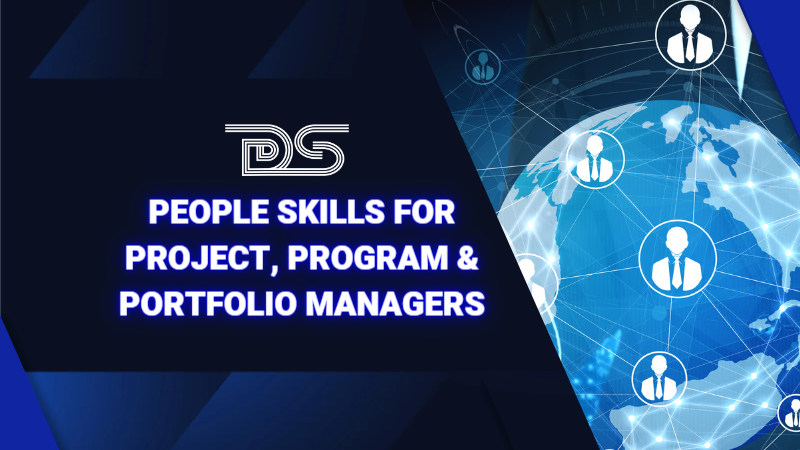
by DharamCW | Apr 21, 2023 | General
What makes a successful Project/Program/Portfolio Manager? Is it the number of years of experience? Technical know-how? Or the one who is good at managing people?
Creating objectives, critical path analysis, work breakdown structures, resource scheduling, and risk management are just a few of the technical areas of project management that project managers usually get training in. However, understanding pertinent people and management issues is important to a project’s success. In addition, a project manager must also continually deal with clients and other stakeholders. As a result, project managers’ people skills, also known as soft skills, are becoming increasingly important.
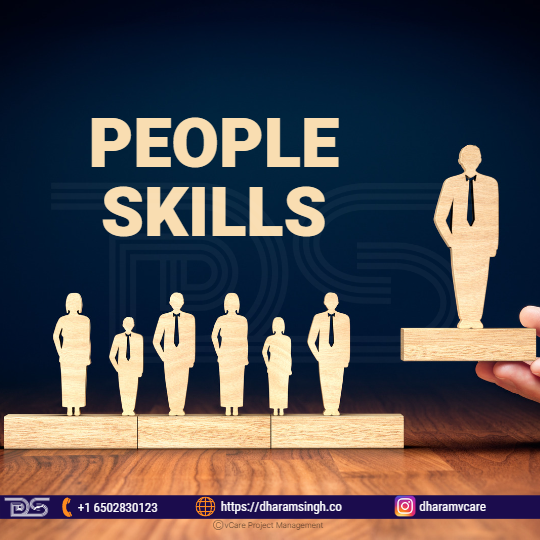
People Skills
People skills
People skills are linked with behavioral patterns or behavioral interactions that assist one in communicating effectively with people. Project leaders with strong people skills may favorably influence others, socialize effortlessly, and overcome public anxiety.
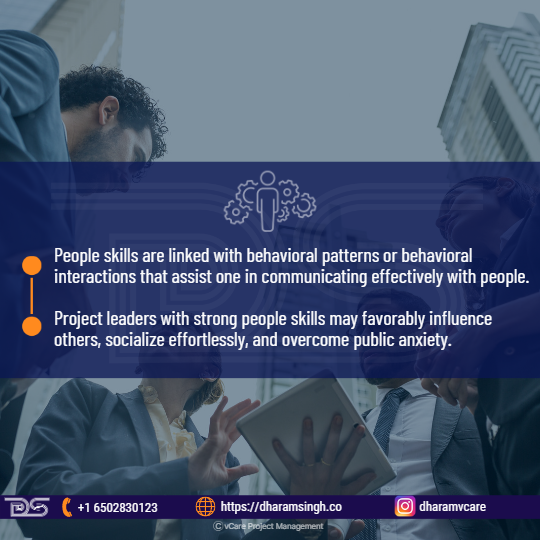
Project Leaders With Strong People Skills
They are transferrable social abilities that allow one to collaborate well with others. The three main types are personal, interaction, and interpersonal skills. These categories achieve the same overall objective: making the working connections with others mutually satisfying, pleasant, and productive.
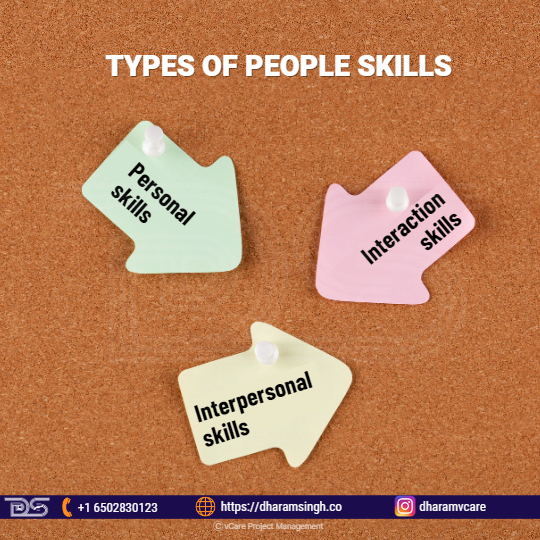
Types Of People Skills
Types of People Skills
- Personal skills: These include the capacity to communicate your skills and exhibit yourself to others successfully. It comprises characteristics such as self-assurance, honesty, and aggressiveness. Furthermore, one must be able to recognize their limitations and make sound judgments based on logic rather than emotion.
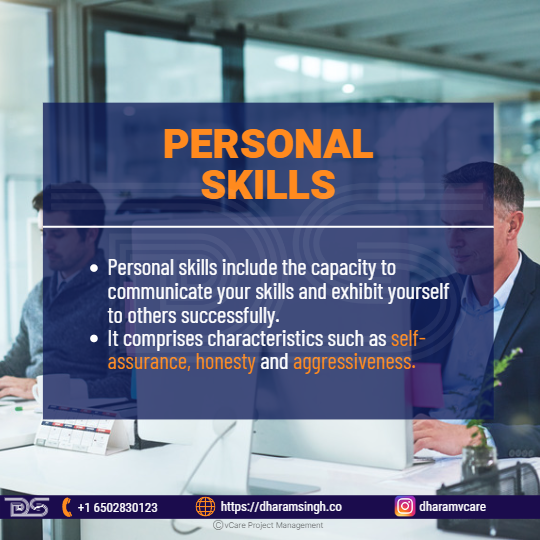
Personal Skills
- Interaction skills: It is essential for understanding the behavior and ideas of others while preserving limits and creating connections. A project manager, for example, should have social etiquettes that need empathy and listening skills to know that you have listened to them and given respect for their limits and requirements to connect with co-workers and clients productively.
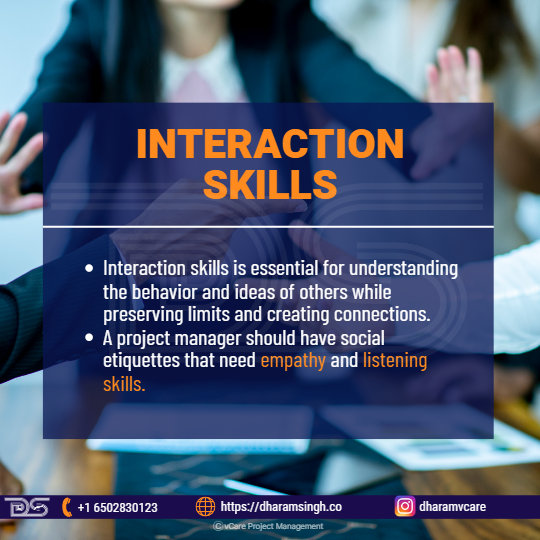
Interaction Skills
- Interpersonal skills: These are related to intercession skills, but they apply mainly to situations in which the persons involved have opposing interests or viewpoints.
Contrary to popular belief, people skills are not subjective concepts. On the contrary, these skills are critical, particularly in the project management role, which is largely concerned with people.
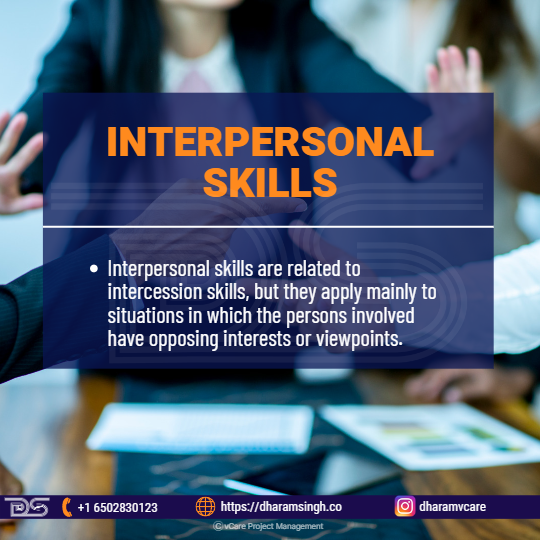
Interpersonal Skills
Project management is more than just completing the project; it is also about how you lead and assist your team. Leading others and leading them through the whole project lifecycle entails a certain amount of responsibility and necessitates certain abilities.
Furthermore, as work evolves, businesses embrace a varied workforce. As a result, people skills are essential for embracing tolerance and diversity. In short, good project management is based on human communication and connection.
Essential People Skills for Project/Program/Portfolio Managers
A successful project professional must possess a wide range of skills. Those that come to mind first are the technical skills required to create a project plan, schedule, budget, and all relevant paperwork. One must also have the conceptual skills to “see” the project as it develops.
However, such talents will only assure project success if the project manager can supplement their technical skills with a wide range of interpersonal skills or people skills. Here are some of the essential people skills for Project/Program/Portfolio Managers:
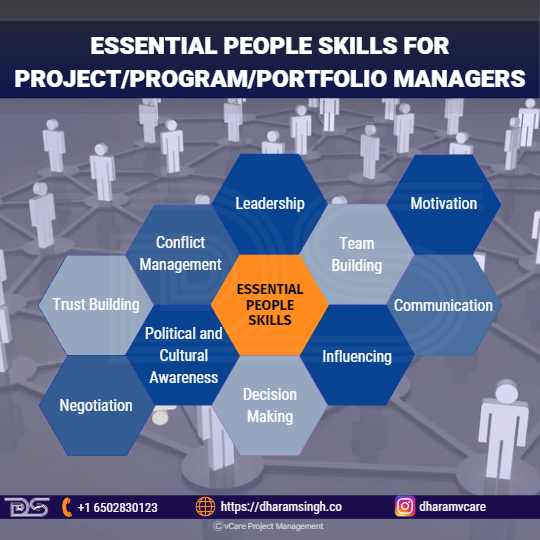
Essential People Skills for Project/Program/Portfolio Managers
- Leadership
One of the crucial skills a successful project manager has to have is leadership. This skill is essential because the project manager frequently has little control over the team members involved. This aspect calls for leadership on their part to handle the project. Although managing via leadership rather than authority might be more challenging, it is typically more effective since it is based on respect and trust.
At the start of a project, a leader must establish their vision and express it to the team. It makes supporting the project’s objectives easier for everyone on the team. Effective leadership will also keep the team members inspired and motivated to perform at their highest level.
- Team Building
Another vital skill for a competent project manager is team building. Because of the nature of projects, personnel from diverse departments are engaged. Most employees might have never worked together and may not even be familiar with one other’s departments. If the project manager can unite these individuals into a cohesive team with the same goal, the project may stay within its objectives.
Although some of the project’s individuals or sub-teams may execute their jobs individually, they must feel like they are part of the overall team. When choosing their part of the project, they must consider what is best for the project, not simply what is best for them and their departmental problem. A sense of belonging to a team that solves an issue for the entire company (rather than playing departmental favoritism) may go a long way.
Creating a team in which each member feels comfortable reaching out to the others will also guarantee that minor problems do not escalate into major concerns later in the project. It is consequently critical that project managers not only understand the duties and procedures involved in team building but also have the skill and finesse to apply them correctly.
- Motivation
If you want your project to succeed, you should concentrate on improving your motivating skills. Having these qualities will assist your project team members to stay interested in the project, strive for excellence, and work toward a common objective.
Good motivating skills will enable a project leader to create an environment where team members can fulfill project objectives while being satisfied with their work.
- Communication
Most professions require excellent communication skills. Some project managers believe the communication part of project management to be their primary job obligation.
Excellent communication skills are essential for building relationships among project team members, establishing trust, and keeping everyone motivated and on track.
A project involves several stakeholders informed of its status, timeframes, progress, risks, and concerns. A skilled project leader must convey all of these facts to project stakeholders on time and in the manner they anticipate. Project managers must also interact effectively with top management within their business.
Giving the interested stakeholders too much or not enough information might prevent the project from reaching its full potential.
- Influencing
It is critical to be able to influence people if you want to be a successful project manager. But what is important is understanding when and how to utilize such skills and avoid becoming a manipulator. There is a narrow path to follow.
A project manager’s responsibility is to bring employees from disparate departments together and get them to work together toward a similar objective. Sometimes, getting these diverse people to comprehend and agree on the specifics of achieving that goal might not be easy. A skilled project leader will utilize their skills to persuade others and assist them in reaching an agreement.
So, think about your relationship and influence over people not just for the time of the project but also for how things will proceed long after the project is complete. After the project, customers and end-users will utilize the goods, deliverables, and outcomes developed by the project. A powerful and positive effect creates a trusting atmosphere among all team members during and even after the project.
- Decision Making
A successful project manager must acquire various talents, one of which is decision-making skills. There are four primary decision-making styles: Directive, Analytical, Conceptual, and Behavioral. Project managers should be conversant with all four since either has to be leveraged at some time. In addition, consultation, consensus, command, and random styles are provided.
Having a decision-making model will facilitate this process. In addition, since so many people who may disagree with a decision are involved in the project, having a process to follow can be very helpful in gaining consensus with the group.
- Political and Cultural Awareness
In today’s world, project managers work in a more globalized context than in the past. As a result, cultural diversity is another critical component of effectively navigating the corporate world as a project leader. A successful project manager must be able to notice and comprehend cultural differences and incorporate them into the project plan.
Cultural differences can impact decision-making and the pace with which work is performed. It can also lead to members acting without sufficient forethought. Recognizing cultural differences can lead to conflict and stress within the project, further delaying it.
Furthermore, it is critical to understand the politics at work in the project environment. The use of political skills can greatly aid a project manager’s success. More significantly, failing to recognize the politics involved can lead to substantial challenges and impediments that can cause a project to be delayed or even destroyed.
- Negotiation
The nature of a project manager’s work necessitates being skilled negotiators. Typically, several stakeholders are involved in the project, and most projects include team members from many departments. This aspect frequently leads to a variety of points of view, which can make it challenging to keep the project on track and within the intended scope.
Negotiation skills can assist a project manager in obtaining an agreement or making a compromise on an issue that may be causing difficulty or delay.
There are several negotiation skills that the project leader should be able to employ. These include assessing each scenario, being an engaged listener, and communicating coherently throughout the dialogue. It can be important to distinguish between the wants and requirements of the people concerned. Another critical focus is recognizing the distinction between people’s perspectives and their interests and concerns directly relevant to the project.
- Trust Building
When collaborating on a project, trust is really valuable. A trusting environment promotes effective relationships and communication among team members and stakeholders. Therefore, a project leader wants to foster an atmosphere of mutual trust. This trust helps to maintain morale, keep conflict at a minimum, and keep everyone working effectively together.
If you were working on a project, you would want everyone participating and working hard to see it through to completion. When you work hard, you expect that others are also working hard to achieve the project objectives. The team leader wants to trust a team member who suggests they can execute a task properly and on time. If someone in the team wants assistance, they want a team that will support and collaborate to achieve the work. So don’t waste time second-guessing someone who isn’t telling the truth or has bad motives.
There are several approaches for a project manager to establish trust. First, a project leader must be a great and open communicator to reduce misunderstandings and build confidence among team members. Often, one may have to put their self-interests aside for the team’s sake and must model and display the behavior they demand from others.
- Conflict Management
On a project, conflict is almost unavoidable. Members of the project team and stakeholders may have differing perspectives, areas of expertise, interests, personalities, work styles, and so on. When one adds additional factors to the mix, such as tight deadlines, resource limits, and communication challenges, it’s easy to understand how conflict might arise.
Conflict often leads to a better solution to a problem. For example, if a team member would prefer to agree or accept the status quo, then risk causing conflict by pointing out a problem, asking a question, or suggesting an improvement. In that case, it is simpler to accept a suboptimal solution. However, disagreement frequently stops the team from working successfully together and diverts attention away from the duties at hand.
The goal is to prevent conflict or its escalation or to know how to regulate or lessen it when it arises if they cannot avoid it. For example, a project manager may use several tactics or methods when dealing with a dispute. They can be aggressive, accommodating, avoiding, or compromising. Some approaches work better in particular situations than others.
The project manager and team members involved in the conflict influence the team’s efficacy. A project manager can also utilize many approaches; if one fails, they may have to try another to see if it is more successful.
Why are people skills important?
People skills are crucial because it is much more difficult for people in an organization to work together to achieve common goals if they fail to express themselves or understand how their co-workers feel about a certain project, task, or difficulty.
As a result, the organization’s production and profitability suffer while creativity and innovation endure. People skills, in particular, may assist us in the following:
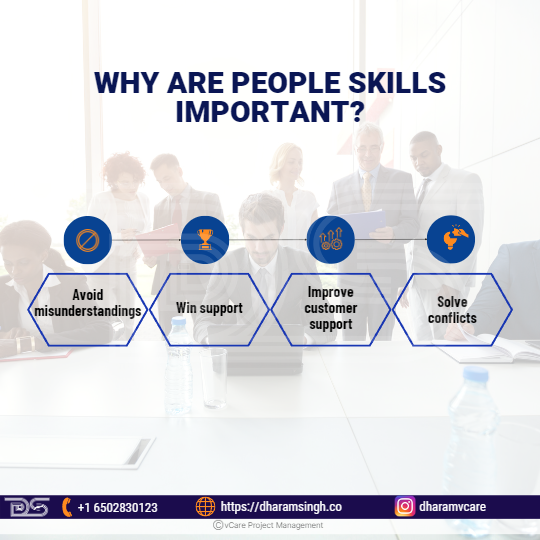
Why Are People Skills Important?
- Avoid misunderstandings: People are less likely to misinterpret what you’re saying if you communicate ideas and instructions.
- Win support: If you can communicate effectively and understand what your team wants to hear, it will be much simpler to persuade them and get them “on board.”
- Improve customer support: You’ll be better positioned to fix their difficulties if you can get inside their minds and comprehend their key problems.
- Solve conflicts: Conflict isn’t always unpleasant, but if it goes unresolved, it can harm morale and productivity. Strong people skills allow us to see things from a new perspective and identify similarities, which reduces the likelihood of significant conflicts.
How to develop people skills?
Even while people skills are critical, they are frequently undervalued by employers when it comes to job advancement. Internal training sessions are frequently centered on teaching hard skills, such as completing a given activity or utilizing a specific piece of software. These methods make it more difficult for professionals to build their interpersonal skills.
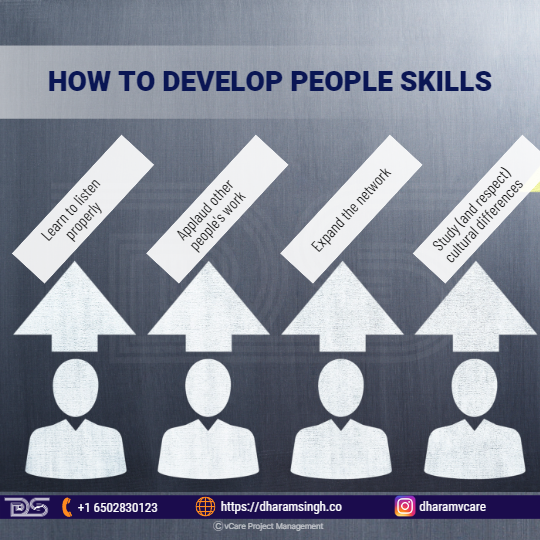
How To Develop People Skills?
But just because something is more difficult does not make it impossible. Here are four suggestions for improving people skills and becoming a more attractive prospect are:
- Learn to listen properly
- Applaud other people’s work
- Expand the network
- Study (and respect) cultural differences
Final Thoughts
Effective project management is challenging but having people skills may help project leaders run projects more efficiently and with less stress. Furthermore, it enables building a team that can handle the most challenging tasks and is more successful and resilient during difficult times.
People skills, on their own, will not keep a project team motivated and engaged. However, arming oneself with the necessary technical skills and intelligent tools may dramatically enhance the workflow and contribute to the project’s success.
Feel free to check out my discussion on this topic with Thomas Walenta in YouTube
For any questions related to your Project Management career, training, and certifications, you can book an obligation free 15 minutes session with me by visiting http://talktodharam.com/
You can subscribe to the vCare Project Management YouTube Channel to catch future videos of our Q&A series and certification success stories: https://bit.ly/2YF0wJl
You can subscribe to and follow my podcasts and interviews with Project Management Experts on YouTube at https://bit.ly/2NDY8wd

by DharamCW | Feb 24, 2023 | General
To be successful in project management, professionals must adhere to specific values like honesty, responsibility, respect, and fairness, which are central to the project management profession and are encompassed by ethics in project management. Therefore, understanding these values and how to apply them is essential for working in project management.
Ethics is important in day-to-day interactions and behaviors in the project management world. “Ethics is about making the best possible decisions concerning people, resources, and the environment,” according to the PMI (Project Management Institute). Ethical decisions can reduce risk, advance positive outcomes, build trust, determine long-term success, and build reputations.
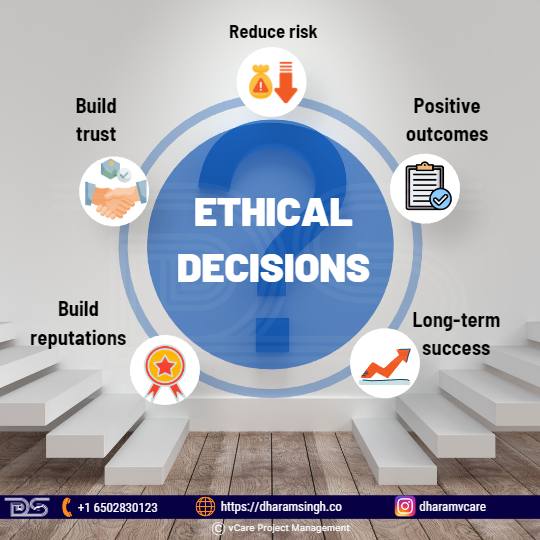
Ethical Decisions
Corporate leaders are responsible for ensuring that their employees practice ethics in the workplace. Failing to follow ethics might result in numerous scandals. The project manager must ensure that all projects are managed and executed efficiently and ethically. If a project manager is ethical, they can influence the project team to work ethically and ensure that all project work is done ethically.
PMI has identified four values for ethical behavior in the project management profession, which can be applied amongst project team members to maintain project loyalty and ethics.
Honesty: Be genuine in your communication and behavior
Responsibility: Take responsibility for your decisions and actions and the consequences that result from them.
Respect: Admire yourself, others, and the resources entrusted to you, such as people, money, and reputation.
Fairness: Decisions and actions should be unbiased, and behavior should be free of favoritism, self-interest, and prejudice.
Therefore, project management professionals must follow the Project Management Institute’s (PMI) Code of Ethics to ensure that all decisions taken are in the best interests of stakeholders and the project team.
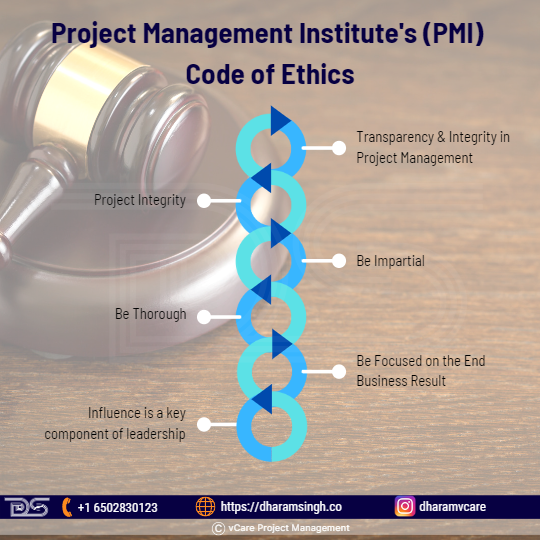
Project Management Institute’s (PMI) Code of Ethics
Transparency & Integrity in Project Management
Project management transparency characterizes a team’s open communication and visibility culture. Information in project management is on a need-to-know basis and is not readily available to everyone. A lack of transparency can lead to resentment or even distrust within the team. Transparency can advance a manager’s career, but it can harm the project manager’s reputation and career if carried out improperly. Therefore, there are many facts to believe that project managers should place a high value on openness and honesty.
The project manager’s transparency can lead to:
- Better performance and accountability
- Eliminates project derailment
- Enhancing teamwork
- Make sure people understand their tasks.
- Communicate openly and explain changes
- Provide and encourage feedback
- Promote knowledge-sharing
- Increase visibility with the right tools
- Focus on project budget
Project Integrity
As a project manager, acting with integrity with other project team members entails being open and honest about their expectations, intentions, and thoughts on their work. In addition, one must have the integrity to make the project team complete the project on time, within budget, and within the project’s scope.
Here are suggestions for acting with integrity with team members:
Be Impartial:
- Be objective and fair.
- Listen to both sides of the tale and different points of view without becoming attached to one in particular due to prejudice or favoritism.
- Rather than patching problems, objective decision-making fleshes them out and allows teams to get to the bottom of them.
Be Thorough:
Complete tasks entirely and thoroughly and validate the steps against a project management methodology of choice. This action ensures that a much more comprehensive project management plan and supporting documentation are created.
Be Focused on the End Business Result:
Regardless of when team members are introduced into the team, they should confirm initial business requirements and the work requested within the scope of their project role. This process enables them to provide their input based on their subject matter expertise, increasing the likelihood of project success.
Influence is a key component of leadership
To influence means to impact other people’s behavior, opinion, and choice. Influence is not the same as power or control. Instead, it is about recognizing what motivates employee commitment and applying that knowledge to boost performance and positive outcomes. The ability to influence others is a necessary leadership trait.
A leader’s ability to influence others is founded on trust; the project manager’s influence grows directly to the level of trust in a relationship. An effective leader motivates team members to act not through coercion but by eliciting their desire and conviction in the leader’s vision and goals. A leader who positively influences others through focused and deliberate effort will gain trust and become a driving force toward excellence.
Let’s look at how leaders can effectively build trust and influence with others.
- Establish credibility
- Engage with team members and build a connection
- Clarify expectations and practice accountability
- Share process knowledge
- Be open to influence
Relationship between stakeholders and project manager to maintain trustworthiness
Communication accounts for up to 90% of a project manager’s job. Conflicts can arise, and projects can fail if there is ineffective communication within the project team. Transparency in the project requires open, two-way communication with stakeholders about the status of a campaign. It keeps clients and stakeholders informed of campaign developments and other project activities.
Why is transparency important for stakeholders?
Transparency is essential in a client-facing project for one simple reason: it fosters trust. When project leader gains the trust of their stakeholders, they are more likely to gain their cooperation and guidance. Maintaining positive stakeholder relationships requires trust, and project stakeholders’ importance cannot be overstated. The support of the stakeholders is critical for project success.
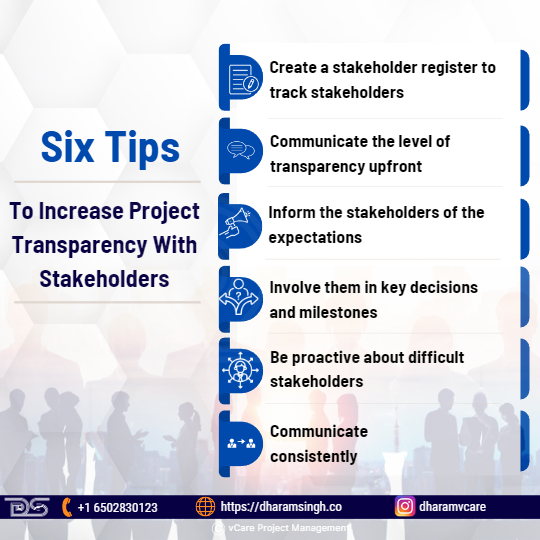
Six Tips To Increase Project Transparency With Stakeholders
Six tips to increase project transparency with stakeholders
- Create a stakeholder register to track stakeholders
- Communicate the level of transparency upfront
- Inform the stakeholders of the expectations.
- Involve them in key decisions and milestones
- Be proactive about difficult stakeholders
- Communicate consistently
Digital Transformation’s Impact on Project Management
Project managers have continued to manage project planning, acquisition, and execution, but their work is evolving with digital transformation.
Most project managers have already incorporated workflow and process automation technology in a few specific areas, like reporting and scheduling. And the majority of them are using digital platforms for project management which can help them stand separate.
How does a project manager acquire the knowledge and experience necessary to lead a digital transformation? What qualities are essential for this type of leader?
PMI’s 2018 Pulse in-depth report ‘Digital PM Skills’ survey conducted by Forrester Consulting for PMI among HR professionals and project managers and identified the top 6 digital-age skills required to get adapted in the digital transformation, like:
- Data science skills
- Innovative mindset
- Security and privacy knowledge
- Legal and regulatory compliance knowledge
- Ability to make data-driven decisions
- Collaborative leadership skills
Cybersecurity’s impact on projects
Project management and the need to establish objectives that protect information security are necessary for today’s project management world. Organizational fragility and vulnerability have increased due to digital transformation, and the proliferation of data and information has become abundant, so it is necessary to safeguard the data from getting misused. Therefore, many businesses are incorporating new elements into their projects to protect their information’s vulnerability, like:
- Security Plan: For the project’s security, a project leader must be aware of the risks to be addressed to develop a security plan. Taking them into account will help them chart the course of the plan and focus on the project’s objectives.
- Business requirements: The project manager must understand the project’s security requirements and business objectives to ensure its completion and success.
- Responsibilities: Each team member should be clear about their responsibilities in terms of security. The well-known RACI (Responsible, Accountable, Consulted, Informed) responsibility assignment matrix is used by many project managers, which aids in ensuring that project objectives are met.
- Security by design: Information security must be considered from the start of a project and throughout the process. Automating processes will improve project success and builds project security.
Pointers to incorporate cybersecurity in project management:
- Determine the project’s sensitive information.
- Evaluate the members’ responsibilities.
- Implement a level of information sensitivity.
- Understand security standards and regulations.
- Include security goals in the project’s objectives.
- Determine the company’s legal responsibilities to the information.
Technology vs. Ethics
Every facet of an organization disrupted by technology shows a possibility of gaining or losing stakeholders’ confidence and commitment. Technology advances can easily outrun the ethical standards that govern their application. Technology’s impact on project ethics is progressing similarly, with employers establishing ethical boundaries that violate employee privacy rights and limit communication abilities.
Some of the technology’s impact on project ethics
- Monitoring Team’s Communications
Project team leaders have monitored employees’ communications during working hours to keep employees focused on work tasks. In addition, because of digital technology and Internet access, there are more chances that project team members can get diverted and utilize the facilities in their personal activities.
The changing definition of the workplace impacts the ethics that underpin the traditional eight-hour work time. It is not ethical simply because technology allows project leader to access their employees and request work at any time. Increasing the working hours to nearly more than their actual hours also blurs the ethical lines in employee compensation.
Employees with restricted access to company property, such as a cell phone or personal computer, may treat it as personal property. An ethical issue may arise when an employee uses office property for non-work-related activities, such as looking for a new job or making personal calls. An employer must establish a clear policy regarding using company property loaned to an employee for business purposes only. This policy enables an employer to develop an ethical standard for using technology.
Ethical Decision Making in Project Management
Decision-making in project management is essentially a great reminder to project success. A truly accomplished project leader inspires, motivates, and builds a strong group that aids their team objectives. The concept of ethical decision-making has also been a focal point in improving project decision-making.
The ethical decision-making process and its roadmap
Every day, a project manager might make thousands of decisions and can come up with the best solution within nanoseconds of hearing about a problem. However, managers must regularly make major decisions incorporating more diligence, forethought, and collaboration with their colleagues. The failure in decision-making can create severe implications and chaos. Thus, organizational performance depends on good decision-making.
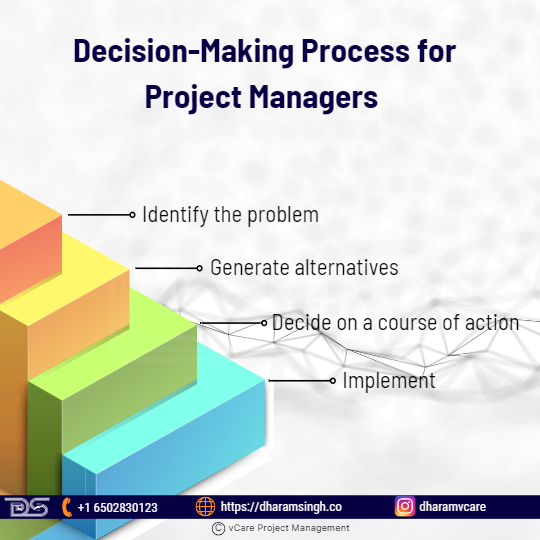
Decision-Making Process for Project Managers
Four steps that can comprise a basic framework for project managers’ decision-making process are:
1) Identify the problem
2) Generate alternatives
3) Decide on a course of action
4) Implement
Ethical Dilemmas in Project Management
The bigger the project, the greater the potential for people or businesses to compromise their moral standards to finish the project on schedule and within budget. The outcomes of project managers and other stakeholders ignoring debatable activity are disastrous, like blown budgets, legal concerns, and even criminal charges, which are too frequent in today’s project environment. Moreover, many businesses are aiming for 100% automation and implementation in the project management process. The project managers need to take charge of these initiatives, which might result in ethical dilemmas involving stakeholders, technology, or communities.
Ethical dilemmas arise when circumstances contradict the project manager’s professional standards or moral values. The project managers must ensure that a project fulfills its social responsibility and well-being commitments by keeping its long-term goals in mind.
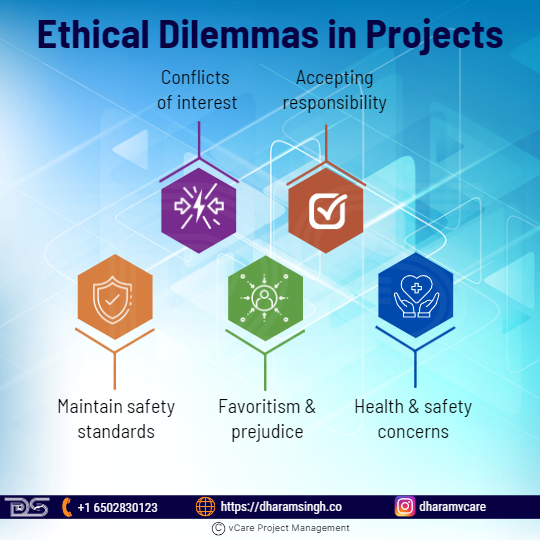
Ethical Dilemmas in Projects
Some Ethical dilemmas in projects include
- Conflicts of interest
For project managers, conflict of interest is a major ethical concern. A conflict of interest occurs only when an individual or group has multiple interests in a project, which may hinder the integrity of the process.
- Accepting responsibility
When a project goes wrong, managers may be tempted to blame workers, supervisors, or vendors for protecting their position. The manager may also consider concealing any evidence that could implicate them in the project’s failure. However, when a project does not go as planned, project managers have an ethical responsibility to accept their failures and start focusing on finding solutions to problems and getting the project back on track.
- Maintain safety standards
Project managers who limit safety standards to save money eventually discover the high costs of not enforcing safety standards with their team. Conversely, a project manager who follows proper safety standards can save a project from incurring costs ranging from minor errors to severe injury or death.
- Favoritism and prejudice
A project leader must not “pick winners” or show bias toward team members. Project managers should choose the participants based on their abilities, not personal preferences. A project manager who shows prejudice toward workers based on race, ethnicity, religion, gender, or other criteria compromises the project’s integrity and exposes the company to a discrimination lawsuit.
- Health and Safety Concerns
Large enterprise projects have high risks and intense deadline pressure. This pressure, unfortunately, can occasionally cause stakeholders to overlook or even hide problems that could endanger the health and safety of project associates or the general public. Although these problems are more likely to occur in the manufacturing, healthcare, or construction sectors, project managers in all sectors should be ready to notify authorities whenever they spot a potentially dangerous situation.
Does project loyalty depend on the individual?
Ethical behavior is essential in all aspects of life, personal and professional. Being an ethical professional benefits everyone, both individually and on a societal and organizational level. Organizations that practice ethics can make their employees optimistic, boost their confidence, and increase their dedication. They can easily draw new clients and consumers due to their honest and ethical behavior, which can significantly improve the project’s sales and profits.
The project manager’s responsibility in Project Management is to manage projects effectively and ethically, as projects are the primary means by which organizations achieve their goals and objectives and develop new services and products. Suppose a new product development project is managed and executed with unethical decisions and actions. In that case, the product will fail to impress and attract customers, resulting in a huge failure and a significant loss in terms of time, project budget, and resources. Customers, clients, and employees value honest and ethical behavior. Thus, a project manager can ideally follow the PMI Code of Ethics and Professional Conduct, which states that they must be honest, respectful, fair, and responsible.
Feel free to check out my discussion on this topic with Thomas Walenta in YouTube
For any questions related to your Project Management career, training, and certifications, you can book an obligation free 15 minutes session with me by visiting http://talktodharam.com/
You can subscribe to the vCare Project Management YouTube Channel to catch future videos of our Q&A series and certification success stories: https://bit.ly/2YF0wJl
You can subscribe to and follow my podcasts and interviews with Project Management Experts on YouTube at https://bit.ly/2NDY8wd


























Recent Comments